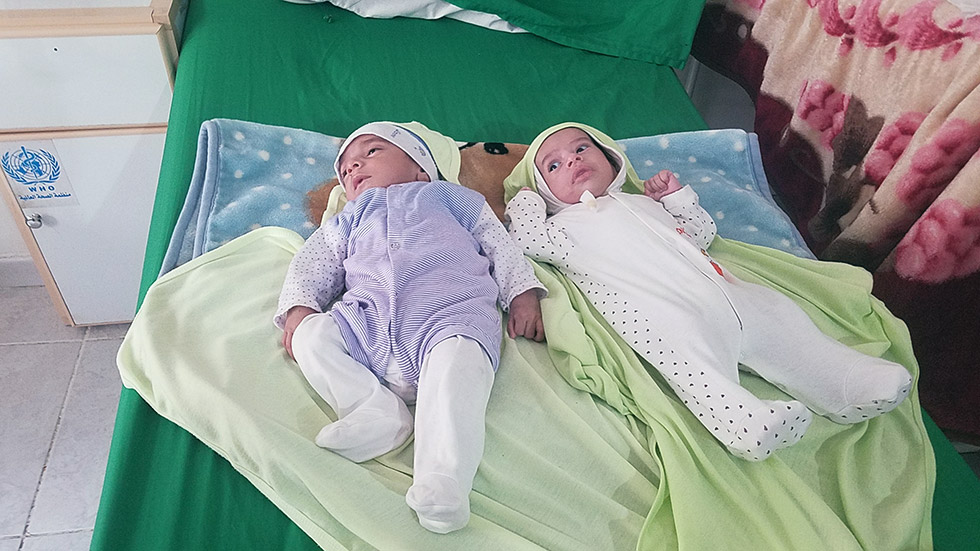 Ahmed and Qaed, 2-month-old twins from Ibb, suffered from severe acute malnutrition. They were admitted at a WHO-supported therapeutic feeding centre in Sana'a. Their condition improved after one week of treatment.
Ahmed and Qaed, 2-month-old twins from Ibb, suffered from severe acute malnutrition. They were admitted at a WHO-supported therapeutic feeding centre in Sana'a. Their condition improved after one week of treatment.
30 July 2020 – The life of children in Yemen is marked by poverty, hunger and disease. In 2020, 2 million Yemeni children suffer from acute malnutrition, including nearly 320 000 from who suffer severe acute malnutrition, of whom up to 10% may end up with severe medical complications with a 90% chance of death, if not treated.
Ahmed and Qaed, 2-month-old twins from Ibb, suffered from severe acute malnutrition. They were admitted to a WHO-supported therapeutic feeding centre in Sana'a.
"Ahmed and Qaed got sick and could not be appropriately fed, which resulted in a severe loss of weight. We had to travel to Sana'a from Ibb where there was no therapeutic feeding centre," said Hana'a, the twins' mother.
Like hundreds of thousands of Yemeni families, Ahmed and Qaed's parents have been struggling to keep their children safe from the war, starvation and disease, as a result of the ongoing crisis.
"My husband graduated from university. Yet, his efforts to find a job have been in vain. Because we couldn't afford to live by ourselves in Sana'a, we had to go back to the village to live with his family. We can barely cover the cost of food, and we couldn't afford the cost of treatment for my husband who had an accident resulting in a spinal disc herniation," said Hana'a.
Half of the population in Yemen is unemployed due to a devastated civil and social infrastructure. The situation is aggravated by disease outbreaks, including cholera, dengue and malaria, which remain major public health problems in Yemen. And recently, COVID-19, which is spreading rapidly across the country.
"Immune systems are compromised by malnutrition, especially in the case of children, leaving them vulnerable to infectious diseases, including COVID-19," said Salah Alshaoof, a nutrition and health professional at the WHO-supported therapeutic feeding centre.
"We work to provide life-saving management to these children and support their caregivers with meals, counselling and provision of admission kits," he added.
In addition to having severe wasting, Ahmed had a hernia. He needed to stay longer in the feeding centre until he recovered. He was then referred for further medical and surgical management. WHO provided the family with therapeutic milk and medicine, financial support for transportation fees and covered the cost of clinical and laboratory investigations.
It took the twins one week to show signs of improvement. "I was advised to attend counselling sessions about breastfeeding and hygiene, as the twins are still in the exclusive breastfeeding period, and I have to learn proper infant feeding practice. I hope that will help me take care of my children better," said Hana'a.
Entisar was brought to Al Sadakah hospital in Aden. The feeble child was suffering from severe acute malnutrition with watery diarrhoea symptoms. The 3-year-old girl is from a low-income family in the Taizz governorate who flew to Aden because of the fighting. Her mother has been psychologically traumatized by the conflict and is no longer able to care for her children, including Entisar.
Hundreds of thousands of Yemenis have developed mental health problems as a result of psychological and physical stress due to large-scale insecurity, displacement and food insecurity.
"I'm the one taking care of my sister and my other siblings," said the 14-year-old sister of Entisar.
WHO procures and distributes child-friendly and gender-responsive admission kits to preserve the mothers' dignity and reduce the financial burden on families during a child's stay at the therapuetic feeding centre.
“Health – understood as a right and as a condition and opportunity for development – continues to be a priority intervention issue for Italian Cooperation, integrated with gender equality and with the rights of minors and of people with disabilities,” said Emilio Ciarlo, Head of Institutional Relations and Communication of the Italian Agency for Development Cooperation.
Thanks to the generous contributions of the Government of Italy and other donors, WHO has provided support to Yemen's 90 therapeutic feeding centres, including 37, which have been recently established. Between 2019 and June 2020, 17 831 children were treated for severe acute malnutrition in WHO-supported centres.
"Thanks to partnerships like this one, the death rate of severely acutely malnourished children under 5 has decreased from 3.6% in 2017 to 2.1% as of June 2020,"said Dr Ferima Coulibaly Zerbo, Nutrition team lead, at the WHO country office in Yemen.


